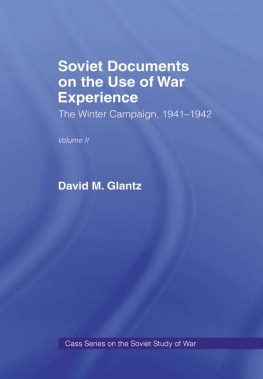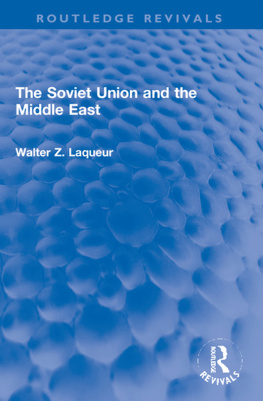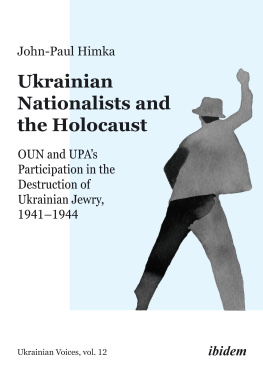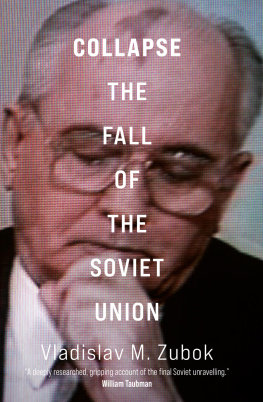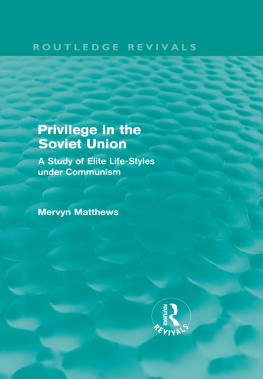THE HOLOCAUST IN THE SOVIET UNION
The Holocaust in the Soviet Union
Studies and Sources on the Destruction of the Jews in the Nazi-Occupied Territories of the USSR, 1941-1945
Edited by
Lucjan Dobroszycki and Jeffrey S. Gurock
With a foreword by Richard Pipes
First published 1993 by M.E. Sharpe
Published 2015 by Routledge
2 Park Square, Milton Park, Abingdon, Oxon OX14 4RN
711 Third Avenue, New York, NY 10017, USA
Routledge is an imprint of the Taylor & Francis Group, an informa business
Copyright 1993 Taylor & Francis.All rights reserved.
No part of this book may be reprinted or reproduced or utilised in any form or by any electronic, mechanical, or other means, now known or hereafter invented, including photocopying and recording, or in any information storage or retrieval system, without permission in writing from the publishers.
Notices
No responsibility is assumed by the publisher for any injury and/or damage to persons or property as a matter of products liability, negligence or otherwise, or from any use of operation of any methods, products, instructions or ideas contained in the material herein.
Practitioners and researchers must always rely on their own experience and knowledge in evaluating and using any information, methods, compounds, or experiments described herein. In using such information or methods they should be mindful of their own safety and the safety of others, including parties for whom they have a professional responsibility.
Product or corporate names may be trademarks or registered trademarks, and are used only for identification and explanation without intent to infringe.
Library of Congress Cataloging-in-Publication Data
The Holocaust in the Soviet Union: studies and sources on the destruction of the Jews
in the Nazi-occupied territories of the USSR. 19411945 / edited by Lucjan
Dobroszycki and Jeffrey Gurock.
p. cm.
Includes index.
ISBN 1-56324-173-0.ISBN 1-56324-174-9 (pbk)
1. JewsSoviet UnionPersecutionsCongresses
2. Holocaust, Jewish (19391945)Soviet UnionCongresses.
3. Soviet UnionEthnic RelationsCongresses.
I. Dobroszycki, Lucjan.
II. Gurock, Jeffrey S., 1949
DS135.R92h64 1993
940.53'18'0947dc20
93-415567
CIP
ISBN 13: 9781563241741 (pbk)
ISBN 13: 9781563241734 (hbk)
Contents
| RICHARD PIPES |
ZVI GITELMAN |
LUKASZ HIRSZOWICZ |
WILLIAM KOREY |
|
MORDECHAI ALTSHULER |
RAFAEL MEDOFF |
Soviet Jewry in the Thinking of the Yishuv Leadership,
19391943 |
DAVID ENGEL |
DALIA OFER |
The Jewish Community in the Soviet-Annexed
Territories on the Eve of the Holocaust |
JAN GROSS |
Local Anti-Jewish Pogroms in the Occupied Territories
of Eastern Poland, JuneJuly 1941 |
| ANDRZEJ ZBIKOWSKI |
| GERTRUDE SCHNEIDER |
The Physical and Metaphysical Dimensions of
the Extermination of the Jews in Lithuania |
| ZVI KOLUZ |
|
SERGEI MAKSUDOV |
Captured Nazi Documents on the Destruction of Jews
in the Soviet Union |
| LUCJAN DOBROSZYCKI |
Yizker-Bikher as Sources on Jewish Communities
in Soviet Belorussia and Soviet Ukraine During the Holocaust |
| ROBERT MOSES SHAPIRO |
An Ongoing Investigation in Light of Documents
Recently Released by the USSR
SIMON SCHOCHET |
Communist regimes always had a problem with the "Jewish Question." Neither Marx nor Lenin acknowledged Jews to be a nation, preferring to treat them as a socioeconomic caste (in the case of Marx, of a uniquely pernicious kind). Its destiny was to assimilate and vanish. The fact that they stubbornly clung to their ways even after the advent of the Communist regime proved perplexing and difficult to explain. The problem was compounded by the fact that the unpopular Communist regime in Russia employed Jews in positions of authority which they had never held before; this led many Russians to blame their miseries on Jews and to identify Communism with them.
To counteract this development, the Communists did all they could to destroy the religious and cultural institutions of Russian Jews, making communal worship all but impossible and outlawing the teaching of Hebrew and the propagation of Zionism. In the 1930s, Jews were systematically eliminated from the government. According to what Hitler told his closest associates, Stalin promised Ribbentrop that as soon as he had enough gentile cadres at his disposal, he would eliminate Jews altogether from his government. As is well known, Stalin intended to have all Soviet Jews deported to Siberia and Central Asia.
The intensification of anti-Semitism in the Soviet Union in the 1920s and especially the 1930s left Soviet Jews entirely unprepared for what was to come. Like all East European Jews, they regarded the Germans with awe and admiration; so much so that during World War I the tsarist authorities had expelled them by the thousands from the combat zone on suspicion of pro-German sympathies. The Soviet press passed over in silence the anti-Semitic excesses in Nazi Germany, pretending that "Fascism" was a reactionary movement directed exclusively against the "proletariat." The mass of Russian, Belorussian, and Ukrainian Jews had, therefore, no inkling that the German invaders came with the express intention of slaughtering them along with the "Communists," and in fact drew no distinction between them.
In the wake of the Holocaust, the Soviet authorities did their best to conceal all evidence of the Nazi war against the Jews in order to maintain the myth of a "Fascist" war on the "proletariat." When the undersigned first visited the USSR in 1957 he found even well-intentioned persons to have been quite unaware of the Nazi obsession with Jews and the systematic nature of their extermination campaign against them.
The present volume gives the fullest available treatment of a subject which until now has received scanty attention from scholars: the deliberate massacre of an estimated one million peaceful citizens inhabiting the USSR and its recently conquered territories by a barbarian horde let loose by the best educated and industrially most advanced country in Europe.
Richard Pipes
Harvard University
The convening of the Conference on the Holocaust in the Soviet Union and the preparation of papers from the conference for publication was supported by several distinguished friends of the Holocaust Studies program at Yeshiva University. The editors of this volume would like to acknowledge the encouragement of Dr. Norman Lamm, president of Yeshiva University, Dr. Egon Brenner, Executive Vice President of the university, and Rabbi Robert S. Hirt, Vice President for Administration and Professional Education at the university-affiliated Rabbi Isaac Elchanan Theological Seminary, in the development of the academic parameters of this scholarly gathering. We are likewise grateful to Eli and Diana Zborowski for their continued dedication to the scholarly study of the Holocaust, to Lawrence Newman for his loyal interest in our work, and to Dr. Laszlo N. Tauber for his commitment to the research and publication of quality works on the history of Eastern European Jewry. The editors would also like to thank the fourteen authors who shared their research and perspectives with the Yeshiva University community.



